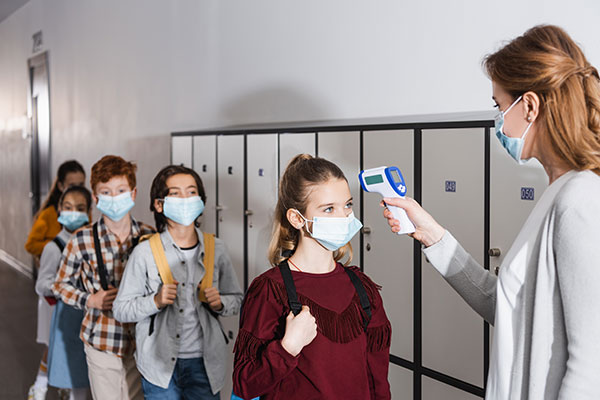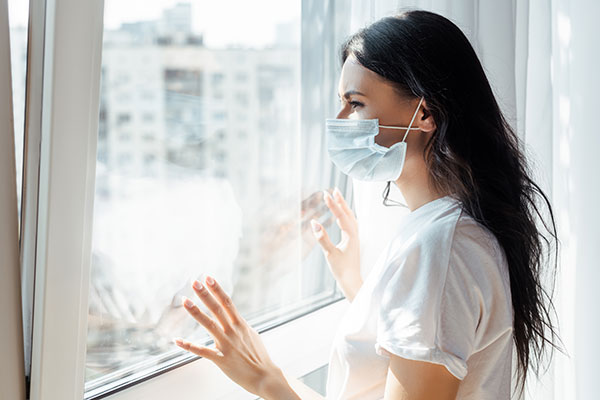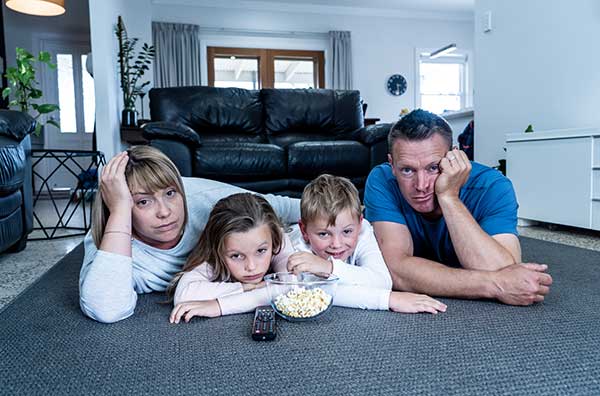Although it seems that the most difficult moments of the pandemic are behind us, it turns out that its effects are still felt and will not disappear soon. Many people complain that the past few months have severely damaged their mental health, and in some cases contributed to the development of depression or anxiety neurosis . This is a good time to consider what is affecting your mental health, how to prepare for a possible next wave, and when the pandemic will end.
Table of contents:
How did the pandemic in Poland affect children and adolescents?
Quarantine and isolation and depression !
Pandemic in Poland – symptoms that may indicate mental health problems!
Difficult emotions during quarantine and home isolation
What emotions do you experience during quarantine or home isolation?
How can we maintain mental health in a pandemic?
What influences mental health?
Who is particularly at risk of suffering from mental health problems?
Fear of losing your job
Pandemic, quarantine and home isolation, how to survive?

The pandemic in Poland officially began in March 2020, when patient zero was diagnosed in our country. Successive events and restrictions introduced by the government literally turned everyone’s life upside down.
We have gone through all sorts of moods as a society. From fear and understanding to restrictions, to anxiety, disbelief, denial and finally rebellion. Today, although many people look at the disease with a distance, we still move around in an environment where we are surrounded by messages about the obligatory wearing of masks, disinfecting hands and maintaining social distance. The most difficult thing seems to be solitary confinement, and it happens in the event of quarantine or isolation.
Coronavirus affects not only the body!
Coronavirus is a disease that affects the respiratory system. So it weakens the body, but it would be a huge mistake to overlook the negative effects it has on mental health. It turns out that many people, even those who did not contract Covid-19 or had someone with the disease in their immediate vicinity, felt the damaging effects of living in pandemic times.
Coronavirus:
- causes enormous tension related to an uncertain future, fear of losing a job, health and safety of loved ones,
- causes fear of losing or reducing income,
- causes internal opposition against restrictions,
- weakens interpersonal relationships when family or friends cannot get together and spend Christmas together,
- causes post-traumatic stress disorder.
A lot some mental health problems, as well as the feeling of extreme tiredness or weariness, may appear, paradoxically, only when when the pandemic in Poland is about to fade away. What does this result from? From the fact that the period of national quarantine was a time of collective mobilization. People stayed home to protect themselves and others, united in a common mission, and had a clear purpose ahead. Adrenaline levels remained high and adapting to the pandemic reality was challenging.
With time, emotions began to subside, a longing for normal life, outdoor sports, entertainment, and face-to-face meetings appeared. Added to this was rebellion, disappointment caused by some political decisions, and a sense of helplessness. When the pandemic is over, post-traumatic stress disorder will stay. Worse still, it does not only affect adults, but largely also children and adolescents.
How did the pandemic in Poland affect children and adolescents?

The youngest during the pandemic had as much trouble as adults. Don’t question how bad they felt when they were distanced from the well-known daily chores of school, with a disturbed daily schedule, and away from friends and schoolmates. Even the young children felt their parents’ stress, and the news of the pandemic from around the world and from Poland fell into their ears.
The appearance of masks on the faces of parents, neighbors, aunts from kindergarten, the need to disinfect hands, new rules and regulations – for the mental health of children and adolescents, the time of national quarantine was just as difficult. So it’s no wonder that psychologists have found so many young patients who need help, especially before going back to school.
Quarantine and isolation and depression !
Is there a relationship between quarantine and isolation and depression? It turns out that it is, and it is quite clear. Why? What makes you feel worse? First of all:
- a sense of loneliness, isolation,
- fear for one’s own health and loved ones,
- a sense of stigmatization and exclusion,
- removal from professional duties and entertainment ,
- Ubiquitous pandemic information, mostly black scenarios, warnings, death and illness statistics.
Patients or at risk of disease through direct contact with Covid-19 patients are often left alone. Although as the pandemic progressed, many people complained about feelings of loneliness and relatively down-to-earth problems, which grew to enormous importance during the quarantine. How do I take my dog for a walk? How do I shop when there is no delivery store in the city? How do I throw away garbage? With time, a number of well-functioning mechanisms were developed, and those who lived next to each other began to be more sensitive to the needs of their neighbors or family members. As you can see, there are good aspects to the coronavirus as well, and these are the things that should be focused on, if possible.
Depression caused by quarantine or isolation is also the result of an exaggerated narrative, raging imagination and the feeling that you are losing control over your life. Why is this happening? Because scenes that you have so far only watched on your TV screen now turn out to be more real than ever before. It is also striking that in part, freedom is lost. Only then is it possible to realize with certainty how much freedom in everyday activities is for a human being, without considering whether your city has been qualified for the green or red zone.
Pandemic in Poland – symptoms that may indicate mental health problems!
The pandemic has been going on for a long time, so scientists have already collected a lot of data about it, and a lot of interesting research and observations have been carried out. What follows from them? That what affects mental health, but also physical health, is the fear of illness, the need to undergo quarantine, fear of losing a job and social isolation.

Living under constant stress is never good for anyone, so it can be unpleasant physically and even panic attacks. These include stomach problems (diarrhea, nausea), fatigue, increased heart rate, trembling hands. Another serious symptom is insomnia, which can make you nervous, and the more you want to sleep, the harder it is to relax. It’s a vicious circle that keeps your thoughts revolving around one thought – when will the pandemic be over? How do you get rid of it? Try to calm down before going to bed, listen to relaxing music, do yoga training or other relaxing activities instead of watching TV.
Difficult emotions during quarantine and home isolation

The above causes difficult emotions – many of them may have been completely alien to you before! Longing for family and friends with whom you used to meet regularly and spent long hours chatting face to face, taking excursions, playing board games. Lack of motivation to dress well, to paint before leaving home – remote work did not require you to do so. Inability to go to your favorite restaurant or to a concert and the accompanying nostalgia, frustration, anger, sadness?
The list of emotions that accompany us in pandemic times can be really long. How can I deal with negative thoughts and feelings? Social media quickly swarmed with ideas for creative use of the time of the national quarantine . Exercising on the carpet, decoupage, catching up on reading and filming, coming up with interesting games for children, pursuing your own passions, finding a new hobby, gardening on the balcony … on the one hand, a huge crowd of inspirations was motivating and gave a lot of ideas for spending time in the four walls.
On the other hand, he exerted pressure because people who switched to remote work, and in addition looked after their children while their schools and kindergartens were closed, felt overwhelmed! Questions: “Am I a bad mother / bad father” appeared very often, especially in psychotherapy.
What emotions do you experience during quarantine or home isolation?
Quarantine is nothing but isolation from the rest of society. It is supposed to limit the transmission of the virus, which is why it is logically correct and necessary. However, most people who experienced a 2-week quarantine perceive this time as difficult and… lonely. Live contacts cannot be replaced by phone or Skype calls, and jogging in the open air – training in front of the TV.
Basically, quarantine or home isolation is a condition that is accompanied by:
- fear of losing a job , rejection, social exclusion – often chronic fear, extremely harmful to health and well-being,
- feeling of loneliness, emptiness, detachment from reality ,
- longing for the possibility of going outside, meeting close people.
What influences the mental health of Poles the most? It turns out that this is fear – not a one-off, but a long-term one, which at times tightens and then softens. Even if you think it’s gone when the pandemic ends, it can come back at the most unexpected moment, such as post-traumatic stress disorder. These emotions cannot be hidden and masked, they must be worked through. How to deal with them in order to stay strong in the event of the next wave of pandemic? What influences the mental health of adults and children?
Mental health care in a pandemic?
In a pandemic, everyone’s focus is on protecting health – mainly physical. What about the mental condition of a person? It is equally important, and keeping it in good shape allows it to survive even the most difficult experiences. Unfortunately, it is often underestimated, as evidenced by the fact that people with disorders, experiencing fear of losing their job and falling ill too late seek professional medical help.
So, how do you care for your mental health in a pandemic? We have some tips in case the fall weather and the next wave of Covid-19 are going to negatively affect you and make you feel low.
- Minimize viewing of news websites, reading news on pandemic statistics in Poland. It is difficult because each of us wants to be well informed and to be at the center of the action (even if it means turning on the TV or radio every day). Avoid constantly refreshing web pages at work – just check them out once a day and then even less often.
- Stay connected with loved ones. When there are no restrictions on meeting, don’t give up on socializing. You can support them in many ways, not only in restaurant meetings, but also during walks, phone calls, and videoconferences.
- Stay active – even at home, you can exercise. Use a stationary bike, train on an elliptical cross trainer, use online workouts that you can watch for free on YouTube.
- Enter your day plan and follow it. Too much responsibility and chaos is the worst combination. All you need to do is develop a day plan for yourself and the rest of the household and try to follow it. Mark the times for wake up, start and finish work, physical activity, household chores, entertainment.
- Get a hobby. The point is to make the best use of the time you spend at home. Avoid stimulants, however – alcohol or intoxicants only temporarily improve your mood, but are much more likely to lead to addiction.
- Seek help for yourself or a loved one. Don’t wait for the pandemic to end. If you experience chronic stress, can’t cope with negative thoughts, have mood swings, become depressed, feel stagnant and unwilling to act (or notice these symptoms in other people) ).
Remember yourself and others. Mutual support brings the best results and, above all, gives a sense of community and allows you to unite in the fight against a common enemy. This awareness alone can save the mental health of vulnerable people who wonder when the pandemic will end and what life will be like after it. Although for now experts agree that the topic of the coronavirus will remain alive for a long time, it must be hoped that the worst stage of the pandemic in Poland is behind us. Proof of this may be the vaccination carried out and the ever increasing number of people who have received two full doses of the vaccine.
What influences mental health?

It is worth looking at what influences mental health, because these are factors that also indirectly determine the state of physical health. In a pandemic, as you already know, both are highly correlated, therefore:
- take care of your sleep quality – get enough sleep, sleeping at least 6, preferably 8-9 hours a day. In addition to proper night sleep, if you can, allow yourself a short, even 15-minute regenerative nap,
- do sports – it does not have to be exhausting exercise or murderous workouts. All you need is walks, brisk walking, a trip to the forest, outdoor gyms, cycling and swimming. Regularity is important – exercise about 3 times a week for about an hour. You will not only experience an improvement in mental health, but you will also reduce weight, strengthen your body, the level of stress and irritation will decrease,
- eat properly – a healthy diet is of great importance for your health and well-being. Providing the body with vitamins and minerals along with food allows you to supplement deficiencies or even prevent their occurrence. Make sure you eat varied and regular, give up fast food, excess coffee, tea and bubble drinks. If you do not have time or feel like cooking on a regular basis, consider using a boxed diet. Healthy catering is very popular nowadays,
- meet people – even if you like solitude and prefer a night under a blanket with a book to a crazy party in the club, don’t give up on social contacts. The time of isolation has made it clear that man is a creature that needs company! Even if it were to be a telephone or Skype call, it would be worthwhile to keep the relationship,
- go outside – unless there is an order to stay at home and leave it only in strictly defined situations, it is worth walking, doing sports, going on trips, taking part in entertainment and cultural events. This is especially important if you not only live in your home, but also work,
- avoid stress and the situations (and people) that cause it – today it’s difficult, but not impossible at all. It is worth trying to look at the situation with a healthy distance, not to get involved in all conflicts or difficult matters, try to think positively and finally master effective relaxation techniques.
As you can see the above tips are nothing special and demanding a revolution in life or a huge effort. It turns out that caring for yourself and your loved ones can be the best recipe for taking care of your mental health. And when the pandemic is over, good habits will stay with you and will definitely have a positive impact on the quality of your future life.
Who is particularly at risk of mental health problems?
How is it that some people view a pandemic as a challenge, another difficulty to be overcome, and for others it is an enormous, almost impossible burden? We need to start with the fact that each of us is different and that different things affect the mental health of each person. However, it turns out that those who received psychological treatment before the outbreak of the pandemic in Poland are more vulnerable. If you or someone close to you has previously suffered from depression or anxiety disorders, it is highly probable that you were in the group of over 50% of people who experienced the effects of the pandemic more painfully than the rest of the population.
What influences the deterioration of mental health, especially in people at higher risk?
- Difficult emotions such as anger, anxiety, irritability, sadness and a sense of helplessness and loneliness,
- worrying, analyzing, thinking ahead,
- losing interest in your passions, work, entertainment, inability to relax and enjoy pleasure, lack of commitment,
- fear of the disease itself, its effects, referral to forced quarantine,
- imposed restrictions, limitations, restrictions, omnipresent prohibitions and orders, reminders to wear a mask and maintain social distance,
- sense of losing control, restriction of freedom and freedom in moving, enjoying entertainment,
- sleep problems (they cause not only physical fatigue of the whole organism, but also negatively affect the psyche).
People who had problems with finding themselves in society earlier in “calm and normal” times, in covid times may suffer more than the rest. The emotions that accompany them are very strong, sometimes impossible to understand or work through without the help of a good psychotherapist . It is a consolation that many therapies are carried out remotely and online, therefore, access to them is very easy.
Fear of losing your job
While health is said to be the most important thing, in the context of the coronavirus pandemic people also had a very strong fear of losing their jobs . In fact, many industries have directly or indirectly suffered from the restrictions and restrictions introduced. Many companies from the tourism, entertainment and gastronomy sectors faced enormous difficulties, some of them, unfortunately, collapsed. For employees, this meant:
- loss of job,
- need to take unpaid leave,
- reduction of employment (e.g. full-time part-time),
- change place of work (from office to home),
- changing the scope of duties.
People who have children faced one more challenge, which was not only fear of losing their job , but also the need to reconcile professional responsibilities with home made. In those months, they were not only employees, but also supervised remote learning for their children and a number of other, everyday tasks, from which there is no vacation. Such commitment was exhausting for many, and it caused not only fatigue, but also decreased productivity at work or an increased risk of errors.
Pandemic, quarantine and home isolation, how to survive?

Although the specter of insulation such as that of March, April and May 2020 does not seem to apply to us, it may turn out that next waves of the pandemic will come and – to a greater or lesser extent will force us to change our behavior and habits.
The specter of quarantine scares you? The thought of isolating your home, that is, being cut back from friends, family, work, and entertainment makes your mood lower? This time you know exactly what it will mean, because you’ve already experienced it “the hard way”. For some it is a relief because they feel that they are ready even for a black scenario and will not let it surprise them. Others, who are constantly wondering when the end of the pandemic may not be ready for the next wave of disease.
If you feel that our tips are not able to help you, or you need professional help, use the services of a psychotherapist. A Peace of Mind specialist can conduct your online therapy, so he is easily available, committed and ready to provide the help you need. We would like to remind you that psychological help may also be needed for children and adolescents, especially in the context of the beginning of the school year. Ending distance learning and moving to classroom teaching brings another challenge, and for many students – the need to adapt again.
Want to stay up to date with our psychological articles?
Like us on Facebook and you won’t miss a thing! 👍
